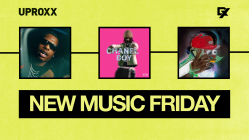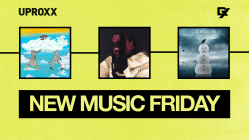Boldy James can rap on anything. More than any production style or scene marker, Boldy’s sound has always just been himself: coldblooded intensity transmitted through a drawling, monochromatic baritone. With the exception of a few songs off 2017’s House of Blues, Boldy’s tone rarely rises above a stoned murmur, making him an ideal canvas for a producer’s experiments. Working with Boldy is an exercise in learning how to shape tension around a rapper. When he raps about his tumultuous upbringing, someone like Sterling Toles can place him in the middle of a blooming spiritual jazz odyssey. The Alchemist takes a different tack, stripping away any superfluous elements, matching Boldy’s steely menace with synth drones and tape echo.
Nicholas Craven, the Montreal-based producer behind Fair Exchange No Robbery, deals in loops. He comes from the Roc Marciano school of deconstructed boom bap, favoring melodic samples often left unadorned. Terminally online old heads sometimes give him flack as a perpetrator of “drumless” production, but Craven has worked with the likes of Mach-Hommy, Navy Blue and Westside Gunn to create some of the most immersive rap music over the past few years. He and Boldy first linked with “Yzerman” in 2021, a string-swept crime novella that wouldn’t sound out of place on an early aughts Ghostface album. The music they put together on Fair Exchange is decidedly weirder, which makes it one of the best projects either has ever done.
Take “Scrabble,” for instance. Craven’s beat sounds like it was sourced from a 70’s Boz Scaggs session tape, mixing easygoing minimalism with the warmth of an overplayed LP. Cowbell taps and Rhodes piano hover around a simple kick pattern, barely there but thoroughly hypnotic. Boldly’s usually stoic delivery is much more conversational, calmly weaving obscure sports and TV references into promises of violence. How he connects it all to the game of Scrabble is a mystery, but it works nonetheless. Boldy and Craven clearly trust each other’s choices and that chemistry easily sells it.
Craven’s sample choices are a bit more off-kilter than his usual buttery soul, varying from 80’s cocaine saxophone (“Designer Drugs”) to 70’s prog (“Stuck in Traffic”); some songs feel like a Mexican standoff seconds from exploding (“Monterey Jack”) and others swirl like smoke from a forgotten cigarette (“Six Toes”). Though Fair Exchange doesn’t have the sustained tension or maximalist scope of some of Boldy’s recent albums, it’s an inspired piece of work. Each beat is as catchy as it is strange, prompting Boldy to respond with some of his most impressionistic writing.
On previous records, Boldy painted photorealistic images of frigid Detroit corners, noting which bullet-chipped brick belonged to which derelict stash house. His eye for detail put the listener in tense moments before gunfire or in the passenger seat of a car hurtling towards tragedy. On Fair Exchange, Boldy is more meditative. His details are as chilling as ever, like when he raps about pocketing dialing an opp’s Grandma on “Power Nap,” but they rarely connect into a full story. Fleeting bits of memory bubble to the surface and quickly disappear, creating a mood that’s more paranoid, braggadocious, and wistful than Boldy’s ever been.
The second verse of “Stuck In Traffic” finds Boldy pacing and chain smoking, recalling moments where life was sure to catch up with him. On “You Ain’t No Menace,” Boldy’s certain of two things: he missed his chance to fuck Ashanti and he’s being set up by people he thought were his friends. Drug references are ubiquitous in Boldy’s work, but the substances on Fair Exchange are used more for escapism than income. As “Six Toes” ends, Boldy brags about how he’s getting richer and immediately realizes how much of a headache it is to maintain that wealth. Craven slows the beat to a promethazine slither and Boldy folds fully into himself.
Fair Exchange No Robbery feels like a natural progression for these artists, both of whom have been dominating and defining underground rap’s current sound. The past three years have seen Boldy and Craven on nearly impeccable runs, dabbling in the same circles, so it makes sense they’d connect for a full project. They make a natural pairing, embracing their strengths but clearly willing to mold their work into stranger shapes. Fair Exchange is a high-water mark in both their careers, as bruising as it is beautiful.










Great project. I get that he is not for everyone, but Boldy had another flawless year. 4 almost equally dope releases so far. This is my favorite though. 4-4.5
3 releases I meant..
Dude is on an incredible run. Boldy has been killing the game for a while. Best albums this year so far are this one, Boldy’s other one “Killing Nothing”, the new Nas, and Pusha T.
5/5
Boldy Cold Flow is perfect winter time music it really is for zoning out if u driving round or chilling few drinks smokes whatever he talks lot bout his lean n pills addictions to deal with past problems he a open book and Nicholas Craven has been my fav producer the last couple years since i heard them fire albums with Ransom and went into his catalog he like the Montreal Alchemist this my AOTY
Boldy Cold Flow is perfect winter time music it really is for zoning out if u driving round or chilling few drinks smokes whatever he talks lot bout his lean n pills addictions to deal with past problems he a open book and Nicholas Craven has been my fav producer the last couple years since i heard them fire albums with Ransom and went into his catalog he like the Montreal Alchemist this my AOTY
Boldy Cold Flow is perfect winter time music it really is for zoning out if u driving round or chilling few drinks smokes whatever he talks lot bout his lean n pills addictions to deal with past problems he a open book and Nicholas Craven has been my fav producer the last couple years since i heard them fire albums with Ransom and went into his catalog he like the Montreal Alchemist this my AOTY
Boldy Cold Flow is perfect winter time music it really is for zoning out if u driving round or chilling few drinks smokes whatever he talks lot bout his lean n pills addictions to deal with past problems he a open book and Nicholas Craven has been my fav producer the last couple years since i heard them fire albums with Ransom and went into his catalog he like the Montreal Alchemist this my AOTY
I love the beats along with the word play. Boldy is so cold. Great invitation to winter.
One the best albums of 2022
One the best albums of 2022
One the best albums of 2022